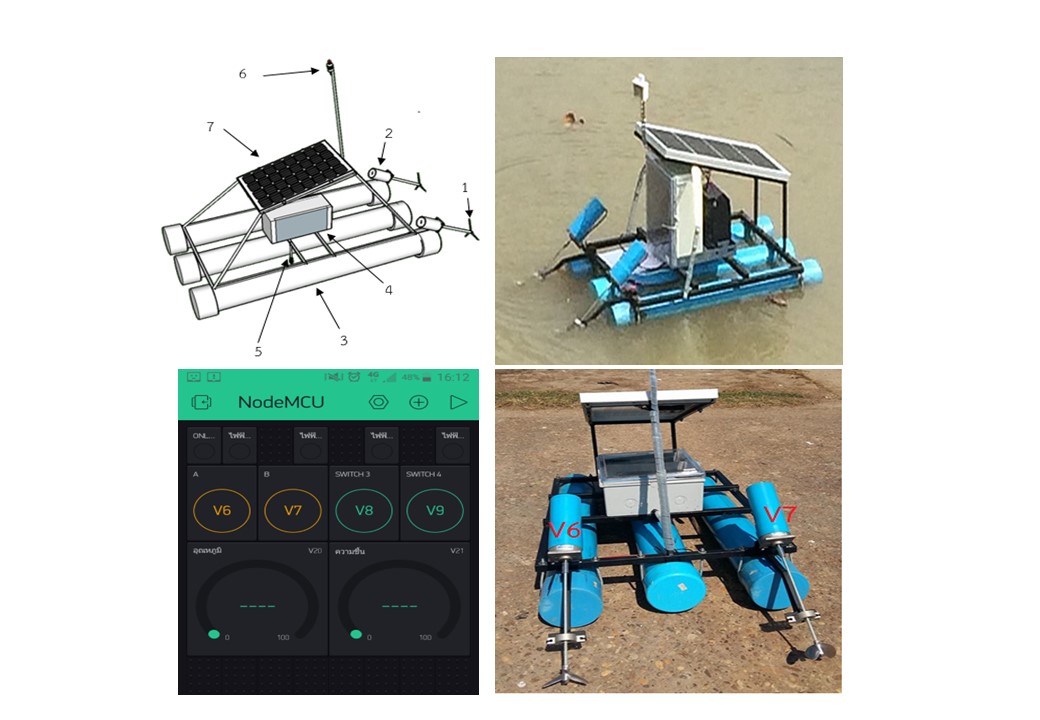Solar Cells Powered to Boat for Water Quality Monitoring of Nonghan River using Wireless Sensor
DOI:
https://doi.org/10.55674/snrujiti.v3i2.254028Keywords:
solar cells power; water quality; wireless sensorAbstract
This research aims to study the most appropriate model design for a wireless water quality monitoring machine (a buoy-format), as well as a WLAN data transmission setup. The machine is to be capable of monitoring water quality in 4 parameters: Dissolved Oxygen (DO) level, temperature, turbidity, and pH level. Four locations were employed for the experiment: 1) The merging intersection pond of water in the front of The Lotus Park at Kasetsart University Chalermphrakiat Sakon Nakhon Province Campus; an agricultural experimental site and recreational park, 2) a canal at Ban Nong Bua Yai municipality; a communal stream of water running through the community, 3) Sakon Nakhon City Wastewater Treatment Facility, and 4) Nam Phung Dam; right before the water merges into the Nong Han Lake, the water is a source for local agriculture, livestock, in-season rice planting, and fishery. This model design of the buoy allows for the maximum net weight of 52.65 kilograms and the capability of moving at a maximum speed of 40 km/h. The machine is controlled wirelessly via a smartphone using the Blynk application; an Internet-of-Things platform (IoT), the navigation and control of the buoy are powered by NodeMCU ESP8266 WiFi controller board. Data is stored in Firebase Cloud Firestore. Information is shown in real-time in the dashboard interface.
References
Sakon Nakhon Rajabhat University. (2519). Project to study guidelines for integrated management and development of Nong Han. [online], https:// nonghan.snru.ac.th
Kasetsart University Chaloem Phrakiat Campus Sakon Nakhon Province . Development feasibility study project Nong Han for sustainable well-being. March 2017. [online], http://www.nonghandatabase.com
Kim SY, Oh B, She CJ, Kim HK, Jeon YK, Shin MG et al. 8p11 myeloproliferative syndrome with BCR-FGFR1 rearrangement presenting with T-lymphoblastic lymphoma and bone marrow stromal cell proliferation: A case report and review of the literature. Leukemia Research. 2011 May;35(5):e30-e34. doi: 10.1016/j.leukres.2010.12.014
Guoping Zhou, Yanan Chen. The Research of Carbon Dioxide Gas Monitoring Platformbased on the Wireless Sensor Networks. International Conference on Artificial Intelligence, Management Science and Electronic Commerce (AIMSEC). [n.p. : n.p.], 2011 : 1-4.
Xiuna Zhua, et al. A Remote Wireless System for Water Quality Online Monitoring in Intensive Fish Culture. Journal Computers and Electronics in Agriculture. (2010): 1-7.

Downloads
Published
How to Cite
Issue
Section
License
Copyright (c) 2024 Journal of Industrial Technology and Innovation

This work is licensed under a Creative Commons Attribution-NonCommercial-NoDerivatives 4.0 International License.



